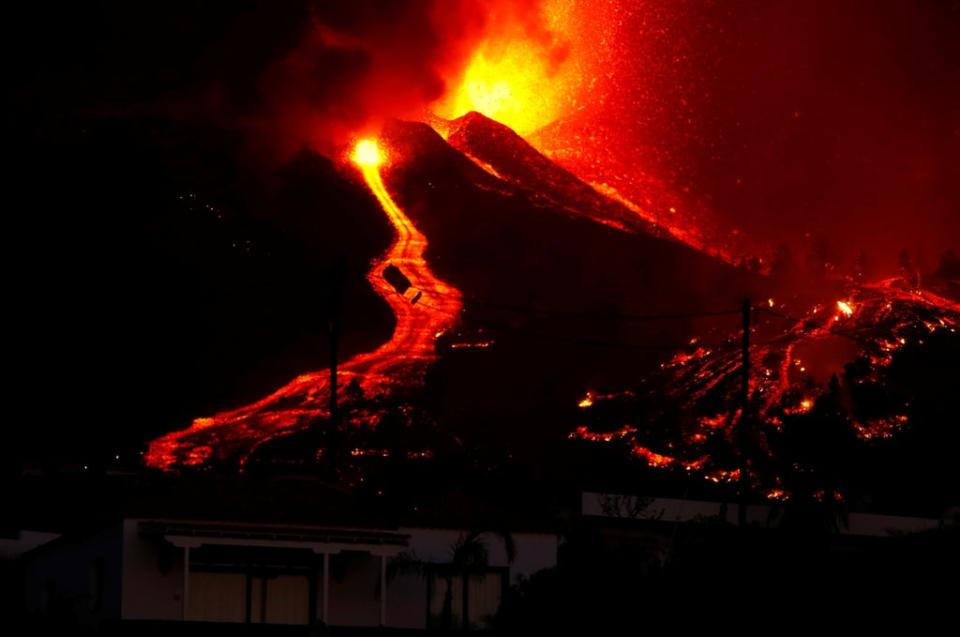Will the volcano eruption in La Palma affect my holiday?

A volcano erupted on Sunday afternoon on La Palma in the Canary Islands, sending up spectacular sprays of lava and causing thousands to be evacuated from their homes.
Mount Cumbre Vieja is set in a national park of the same name in the south of the island, which lies 133 miles west of Tenerife.
Shortly before the eruption at 3.15pm local time, the island authorities started evacuating elderly locals and farm animals in the vicinity; two hours later, five rivers of lava were trickling down the hillside, while after dark local photographers captured dramatic pictures of lava shooting up towards the night sky.
On Tuesday, authorities warned that lava flowing into the sea could release toxic gases.
Some 360 tourists were also evacuated following the eruption, and taken to the nearby island of Tenerife by boat on Monday, said a spokesperson for ferry operator Fred Olsen.
But how destructive is the eruption, and will it disrupt travel to the Canary Islands?
Here’s everything we know so far.
How serious is the eruption?
This is the first time Cumbre Vieja, a mountain range and active volcano, has erupted this century - it previously erupted twice in the 20th century, in 1949 and 1971.
A 4.2 magnitude earthquake occurred before the eruption, on the western slopes of the range.
So far there have been no casualties, though the local authorities say over 160 homes have been destroyed by the lava flow, with some 6,000 people ordered to leave their homes in villages close to the volcano. The eruption has also caused some forest fires around the hillside.
Experts believe the lava flow could continue for up to six or eight weeks.
“The lava flows, that have been descending the slopes of the municipality of El Paso in the Cabeza de Vaca area, are advancing at approximately 700 metres per hour, and thermal images have determined that they have a temperature of 1,075 degrees Celsius,” reported Canarian Weekly this morning.
The main areas being evacuated are Cabeza de Vaca and El Paraiso in the El Paso area, with around 6,000 locals moved away from the scene.
However, authorities have said they may need to evacuate as many as 10,000 people in the wake of the incident.
Lava streaming from the volcano is now close to reaching the sea, sparking concerns the flow could mix with saltwater to produce “explosions and the emission of toxic gases”, according to the crisis team at the Canary Islands Volcano Emergency Plan (Pevolca).
Experts have warned that a large explosion of water steam could be triggered once the lava tongue, which has a temperature of more than 1,000C, makes contact with the sea.
The steam plume resulting from the explosion could cause hydrochloric acid and small volcanic glass particles to fall, though it is unclear when this will happen.
Parts of the island’s southwest coast may also be affected by landslides and rock falls, with tourists understandably being urged to stay away from the wider national park.
Are flights or holidays to the Canary Islands being cancelled?
So far, no flights or holidays from the UK to the Canary Islands, or vice versa, have been cancelled.
On Monday 20 September, local Canarian airline Binter said it had cancelled four flights to and from the neighbouring island of La Gomera, due to the eruption.
La Palma’s airport, in Santa Cruz in the north of the island, did close for around an hour on Sunday 19 September, in the immediate aftermath of the eruption.
Two aircraft were diverted to Tenerife North airport, while a Tui plane was held on the ground during that time before being cleared for take off to Amsterdam.
Air traffic has now resumed as normal in La Palma, with no reports of volcanic smoke disrupting international flights, though the airspace immediately above the volcanic site is currently a no-fly zone.
Tui, which operates direct flights from the UK to La Palma, said: “Currently we don’t have any affected flights, however we will continue to monitor the situation closely and will contact customers should their holiday be impacted.”
The Foreign Office has updated its travel advice for Spain with an alert about the eruption, saying: “If you are in an affected area you should follow the advice of local authorities, including social media updates from Cabildo de La Palma. If you are planning to travel to the island imminently you are encouraged to contact your tour operators / airlines.”
What are the authorities saying?
Spanish prime minister Pedro Sanchez delayed his trip to New York to attend the UN General Assembly on Monday to visit the affected area.
He praised scientists for monitoring the eruption, saying their work was “fundamental” in avoiding casualties, and promised that his government would help local people rebuild their lives.
Canarian prime minister Sergio Rodriguez has said: “The lava is moving towards the coast and the damage will be material. According to experts there are about 17-20 million cubic meters of lava.”
Read More
National Express and Stagecoach in merger talks
Boris Johnson expected to push Joe Biden to lift UK travel ban
When will UK-US travel reopen?
Welcome to the future: How London’s transport networks could expand even more

 Yahoo News
Yahoo News 